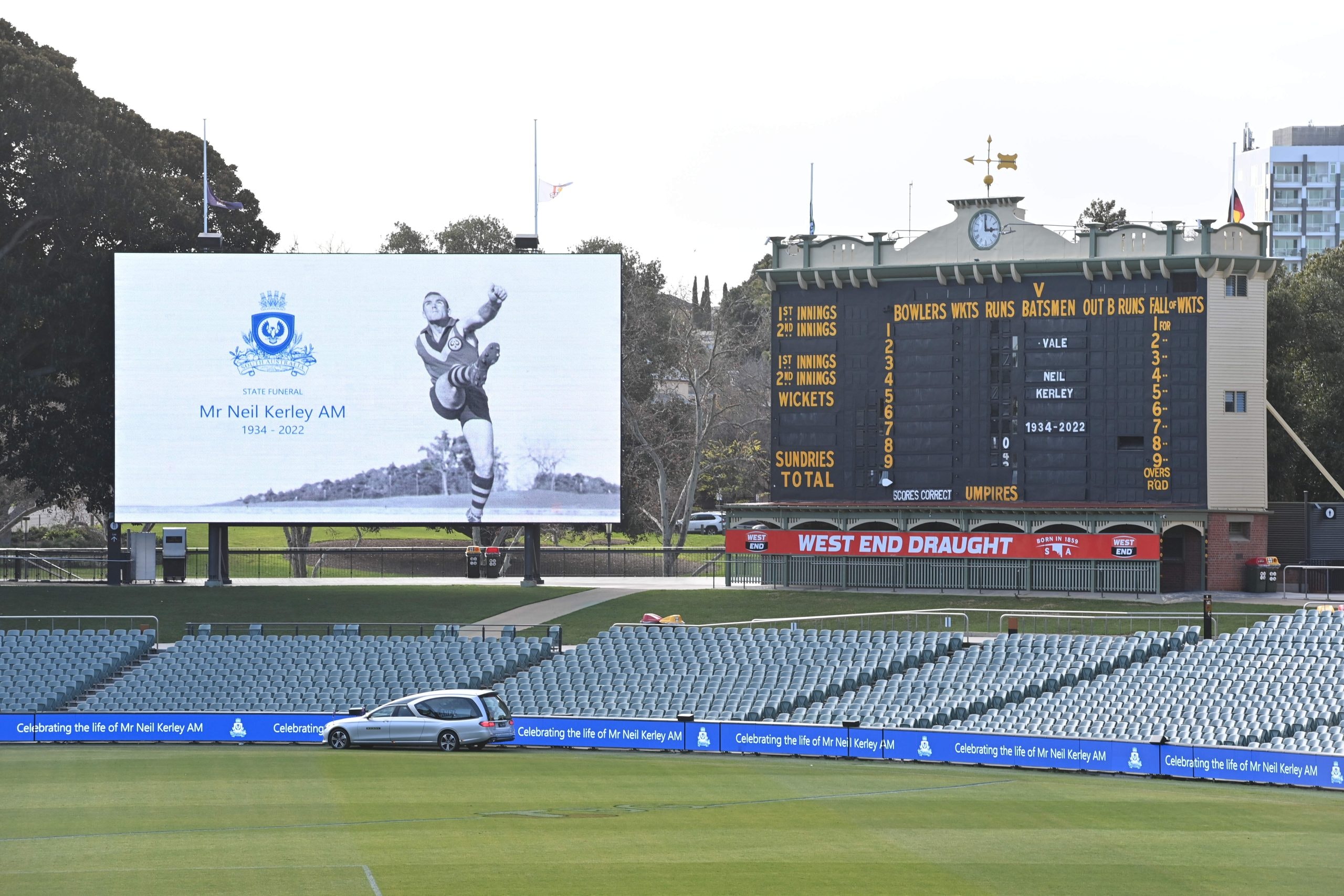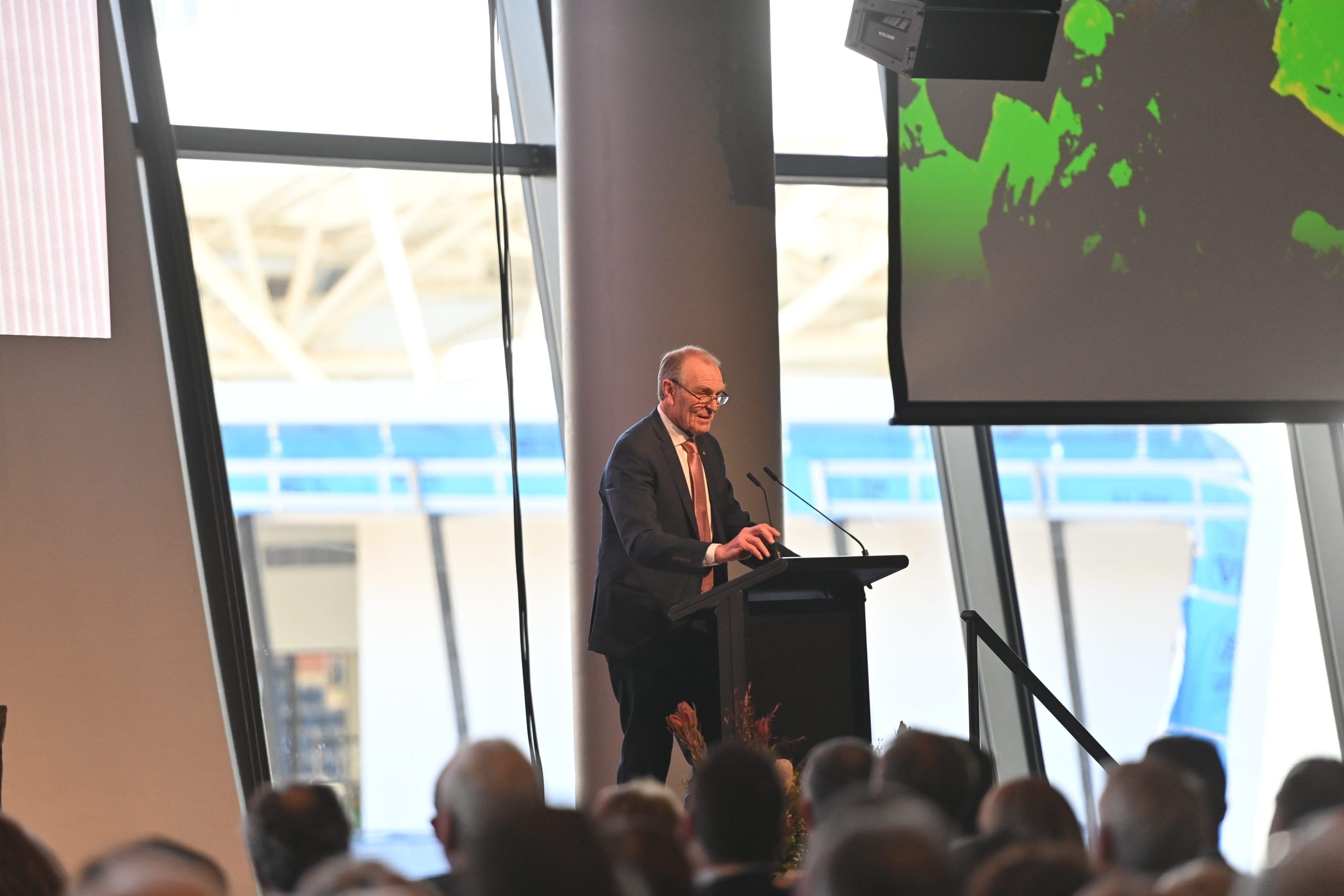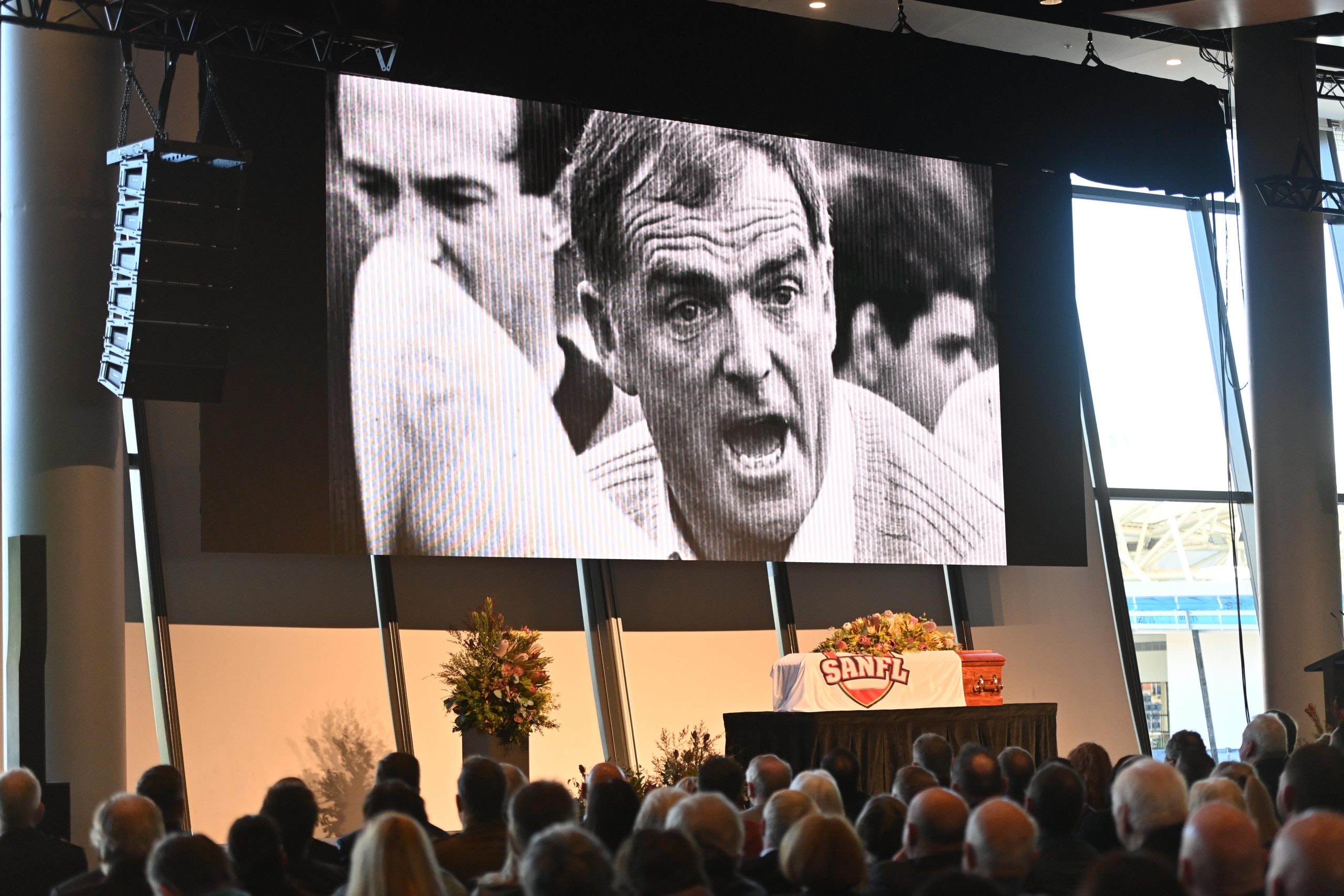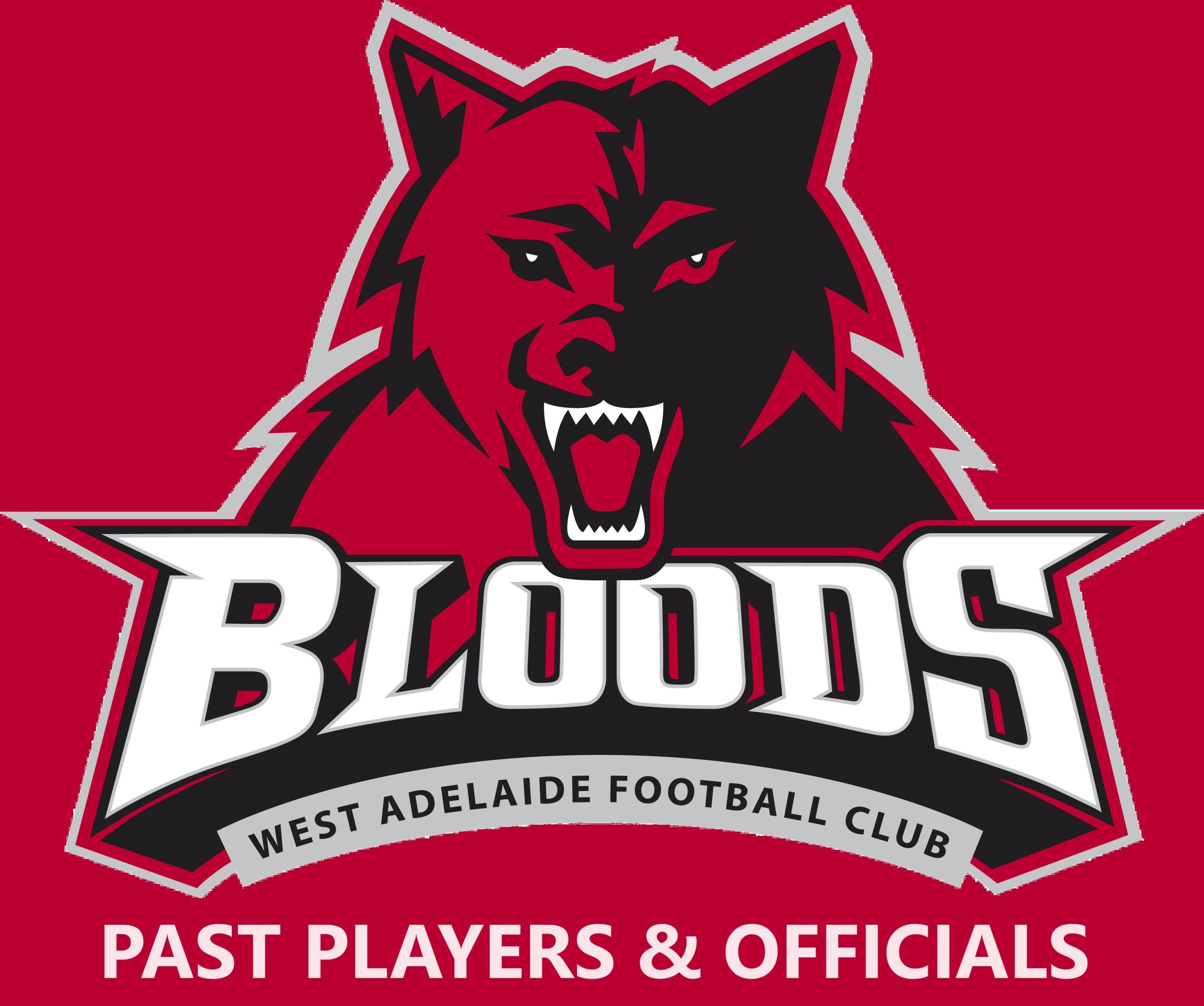
King Kerls Farewelled
By PETER CORNWALL
The life of South Australian football icon Neil Kerley was on Monday celebrated at an emotional, moving State funeral at Adelaide Oval, the site of many of his greatest triumphs.
Leading dignitaries, politicians and a who’s who of football royalty were among more than 1000 guests paying their last respects to a much-loved and highly-respected South Australian who was often referred to as ‘the King’, such was his standing in the State he loved.
Kerley, also affectionately known as ‘Kerls’, or ‘Knuckles’, died, aged 88, on June 29 when he suffered a medical episode while driving near his Walker Flat home.
There has been an outpouring of grief since and his remarkable achievements as an inspirational footballer, coach, media identity and larger-than-life personality over seven decades were recalled amid tears and raucous laughter by dignitaries and family in the William Magarey Room at Adelaide Oval.
Kerley’s daughter Gail, son-in-law Leigh Hossack and grandson Campbell paid moving tributes.
Long-time friend, former AFL chief executive Wayne Jackson provided a eulogy, while Graham Cornes and Peter Marker, Glenelg greats under Kerley who became influential media commentators, provided heartfelt reflections.
Victorian media personality and long-time Collingwood president Eddie McGuire and former Crows champion Mark Ricciuto rounded out the tributes before Kerley’s coffin was given a final lap of honour around Adelaide Oval’s hallowed turf to a standing ovation from guests.
A loud blast of the final siren at the ground put a fitting end to a moving celebration of the life of an SA great.
Also watched by thousands online, mourners included the Premier, Peter Malinauskas, Governor, Honourable Frances Adamson AC, and SA football greats including Barrie Robran, Malcolm Blight, John Platten, Peter Carey, John Halbert, Andrew Jarman, Ken Eustice, Peter Darley, Rex Voigt and Kym Hodgeman. AFL CEO Gillon McLachlan was among those who had travelled from Melbourne, along with Robert DiPierdomenico and Sam Newman.
And there were fans adorned in West, South, Glenelg, Eagles, Central and Adelaide Crows scarfs, caps and jackets and one Tigers fan was draped in a duffel coat from the 1970s.
Graham Cornes“He (Kerley) would want it to be big, there’s no doubt about it, he would want it to bring tears but he would want laughter as much as anything.''

SA Football great Graham Cornes reflects on the life of Neil Kerley. Picture – Keryn Stevens (The Advertiser)
“He would want it to be big, there’s no doubt about it, he would want it to bring tears but he would want laughter as much as anything,” Cornes said of the gathering, which ticked all those boxes. “If there was one word to describe Neil Kerley, it was ‘leadership’. “He was born to lead.”
Cornes also believed Kerley led the way among football identities in what he described as the golden era of SA footy.
“It began in the early ’60s, when television brought the game into our lounge rooms, and it stretched through to the late ’80s,” he said.
“It was a football era that defined a generation and Neil’s influence extended right throughout it. The names from that era were some of the greats of football – Williams, Oatey, Motley, Head, Halbert, Cahill, Ebert, Robran, Blight. We could debate it but Kerls was the most powerful, charismatic figure of that era. They called him the King, King Kerley and there’s only one king.”
Eddie McGuire''We Victorians love Knuckles.''

The stage was set for Neil Kerley’s State Funeral. Picture – Keryn Stevens (The Advertiser)
Donald Neil Kerley, born in Barmera in 1934, was a talented iron man and extraordinary leader who played 265 games with West Adelaide, South Adelaide and Glenelg, along with a remarkable 32 games for SA.
He won premierships as coach at West (1961 and ’83), South (taking it from bottom to top in 1964) and Glenelg (1973), while also lifting West Torrens and Central District into finals. In all, he coached 628 SANFL games. As if that involvement with five clubs was not enough, he played an influential role as inaugural football manager of the Adelaide Crows.
Marker, who could not find the one word that could encapsulate all Kerley’s many attributes and achievements but described him as “unforgettable”, said there were a couple of words Kerls didn’t like.
One was competitive. “Don’t talk to me about ‘competitive’ – if that’s the only thing you want in life, you’re never going to win.”
Another was potential. “I’m only interested in what you can do now.”
Jackson described Kerley as a “very fair, very generous and a very caring person … a very rare breed of person”.
While Kerley loved nothing more than beating the Vics – with the Crows or in State footy – there was always healthy respect and wonderful friendships.
And McGuire declared: “We Victorians love Knuckles.” He said Kerley was regarded in Victoria as “a legend” and believed he should be elevated to a legend of the game in the Australian Football Hall of Fame.
All the 1000-plus guests at the King’s moving funeral know he already is one.
Related News
-

2026 Fixture Release
-

Christmas Holidays Opening Hours
-
 Coaches Report
Coaches Report2025 SANFL U18’s Grand Final – Coaches Report
-
 Coach Announcement
Coach AnnouncementNathan Bassett announced as our Senior Men’s Coach
-
 Coaches Report
Coaches ReportU16’s Grand Final Coaches Report
-

Sturt win 2025 SANFL U18 Premiership
-

West Adelaide win 2025 SANFL U16 Premiership
-

2025 SANFL U18 Grand Final Preview and Teams






















